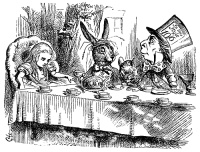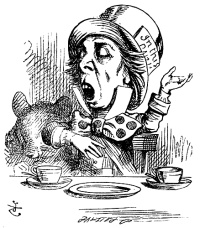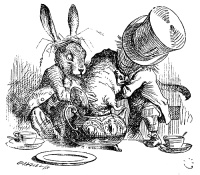A Mad Tea-Party
Studies in Alice VII, by Marc Edmund JonesThis lesson considers the seventh chapter of Alice in Wonderland and the seventh great principle of wisdom in the Philosophy of Concepts as revealed through the adventures of Alice is that genius is insanity usefully applied. The close interrelation between genius and insanity is thoroughly recognized by the world at large today, but beyond acceptance of the fact the academic scholars have been willing to let the matter rest as something unexplainable or as example of the compensation of nature or deficiency in certain faculties making up for extreme brilliancy in others. That genius is itself insanity is often seen to be true by the layman but the truth is too disagreeable for the world's intelligentsia to accept wholeheartedly. The educated man of this smug age by an odd manifestation of conceit is unwilling to admit any indebtedness to one who by conventional standards he must classify as inferior to himself. Thus moral turpitude in an artist in America renders the art unworthy of consideration. Presumably in time the Babbits will achieve the moral courage to refuse to be saved from drowning by a bootlegger. Genius and insanity are identical in the fact that both are abnormality and it will be obvious that this abnormality may be either sub or super normality. In a humorous sense it is insanity if it is discovered before it justifies itself and genius if it justifies itself before its discovery as a pathological symptom. Fundamentally unbalance may be as constructive as destructive and examination of the history of human progress will demonstrate the fact very quickly that unbalance is the first manifestation of progress. So-called human balance is too often mere stagnation.
 Here is the principle of reality.
Reality is a function of duration
or time and it is for that reason
that man conceives of
illimitable reality as eternity or
unlimited time. To God he
gives mastery of space and
intelligence but to himself he
apportions a share in unending
duration as mark of his
immortality or reality in fact.
The principle of reality gives
proper distinction between
conscious experience and
dreams. In the latter case there
is generally as great or even
greater sense of reality for the
moment but the dream condition does not endure. Duration or the factor of time alone serves as
the basis of all conceptions of reality and it is through this principle that practical distinctions
between insanity and genius may be obtained. Insanity foreshortens experience and to the
insane man reality of the moment may be so intensified as to lead him to unbelievable feats,
whereas genius lengthens experience and creates reality great enough to survive its creator and
become a permanent contribution to the race and to civilization. The symbolism of the seventh
chapter in Alice is therefore interesting in its unwitting revelation of the points so far brought out
in this lesson. Of the three characters here met by Alice, two are indicated as insane and the
third symbolizes an equally unbalanced but more passive condition. The hare is said to be mad in
March because of the frenzied antics of these animals during their rutting time in that month.
The phrase as mad as a hatter is of unknown origin but probably of ironical force originally from
the character of the type now somewhat duplicated by the male milliner or dressmaker. The
dormouse eats nuts, suggesting the squirrel of present-day slang or the American species to
which it is most closely related, and goes into a stupor during cold weather. Here are the three
forms of unbalance in the higher vehicles of man, or the emotional and mental and habit natures
in order of their speaking to Alice, and she is most puzzled by this contact with her inner selves
as they are now developing into seeming unbalance. Her emotions offer her nonexistent wine or
sensation she cannot yet recognize and the butter symbolizes knowledge because it is churned
from milk into the watch or her consciousness to intensify being or stop time and intensify
reality. Her mentality attempts to establish liaison with her and fails to recite "Twinkle, twinkle,
little star" correctly. Her habits attempt to involve all three selves or three sisters in the
superficial lure of life. Treacle is the common British term for molasses. In this experience
time is always six and life is always the mad tea party for the intensification of experience with
the physical Alice succeeding to the untidy places at the table of being as they are made untidy
for her by her own higher selves in terms of this inner symbolism.
Here is the principle of reality.
Reality is a function of duration
or time and it is for that reason
that man conceives of
illimitable reality as eternity or
unlimited time. To God he
gives mastery of space and
intelligence but to himself he
apportions a share in unending
duration as mark of his
immortality or reality in fact.
The principle of reality gives
proper distinction between
conscious experience and
dreams. In the latter case there
is generally as great or even
greater sense of reality for the
moment but the dream condition does not endure. Duration or the factor of time alone serves as
the basis of all conceptions of reality and it is through this principle that practical distinctions
between insanity and genius may be obtained. Insanity foreshortens experience and to the
insane man reality of the moment may be so intensified as to lead him to unbelievable feats,
whereas genius lengthens experience and creates reality great enough to survive its creator and
become a permanent contribution to the race and to civilization. The symbolism of the seventh
chapter in Alice is therefore interesting in its unwitting revelation of the points so far brought out
in this lesson. Of the three characters here met by Alice, two are indicated as insane and the
third symbolizes an equally unbalanced but more passive condition. The hare is said to be mad in
March because of the frenzied antics of these animals during their rutting time in that month.
The phrase as mad as a hatter is of unknown origin but probably of ironical force originally from
the character of the type now somewhat duplicated by the male milliner or dressmaker. The
dormouse eats nuts, suggesting the squirrel of present-day slang or the American species to
which it is most closely related, and goes into a stupor during cold weather. Here are the three
forms of unbalance in the higher vehicles of man, or the emotional and mental and habit natures
in order of their speaking to Alice, and she is most puzzled by this contact with her inner selves
as they are now developing into seeming unbalance. Her emotions offer her nonexistent wine or
sensation she cannot yet recognize and the butter symbolizes knowledge because it is churned
from milk into the watch or her consciousness to intensify being or stop time and intensify
reality. Her mentality attempts to establish liaison with her and fails to recite "Twinkle, twinkle,
little star" correctly. Her habits attempt to involve all three selves or three sisters in the
superficial lure of life. Treacle is the common British term for molasses. In this experience
time is always six and life is always the mad tea party for the intensification of experience with
the physical Alice succeeding to the untidy places at the table of being as they are made untidy
for her by her own higher selves in terms of this inner symbolism.
 The achievement of imagination in the
chapter, or the seventh great scientific anticipation,
is the revelation of the many principles of
psychiatry that resolve the functions of mind to law
and deal successfully on the whole with the
diseased conditions of man's mentality.
Fundamentally normal life is now discovered to be
built on a proper rotation of interest, whether this
rotation is gained by outer and artificial means as in
deliberate changes of scene or evening relaxation to
relieve the mind from the tension of the day's
routine or Sunday pleasures to give contrast to the
working days of the week or summer vacations to
give new life to the year or in careful budgeting of
time and attention so as to provide this relaxation
naturally by organization of the mental processes.
The reality of interest is discovered to rest in
successiveness, and therefore concentration is found to be not so much a rigid fixity of attention
as a fluidity or recurrency of attention to an object or matter that for the time is of fixed concern.
It is in view of this new knowledge of mind that the older ideas of meditation are not being
abandoned by occultists who are dependent on the physical traditions of their science. The
traction on mind of the physiological processes of the body to the extent where temporary
insanity will result from puberty or menopause is but added demonstration of the principle found
consistently through nature. Thus it is necessary to rotate crops and before the development of
the telephone, automobile and other cultural necessities the huge percentage of rural insanity that
was no less fact for its frequent mildness was but added proof of the necessity for rotation of
interest in all life experience.
The achievement of imagination in the
chapter, or the seventh great scientific anticipation,
is the revelation of the many principles of
psychiatry that resolve the functions of mind to law
and deal successfully on the whole with the
diseased conditions of man's mentality.
Fundamentally normal life is now discovered to be
built on a proper rotation of interest, whether this
rotation is gained by outer and artificial means as in
deliberate changes of scene or evening relaxation to
relieve the mind from the tension of the day's
routine or Sunday pleasures to give contrast to the
working days of the week or summer vacations to
give new life to the year or in careful budgeting of
time and attention so as to provide this relaxation
naturally by organization of the mental processes.
The reality of interest is discovered to rest in
successiveness, and therefore concentration is found to be not so much a rigid fixity of attention
as a fluidity or recurrency of attention to an object or matter that for the time is of fixed concern.
It is in view of this new knowledge of mind that the older ideas of meditation are not being
abandoned by occultists who are dependent on the physical traditions of their science. The
traction on mind of the physiological processes of the body to the extent where temporary
insanity will result from puberty or menopause is but added demonstration of the principle found
consistently through nature. Thus it is necessary to rotate crops and before the development of
the telephone, automobile and other cultural necessities the huge percentage of rural insanity that
was no less fact for its frequent mildness was but added proof of the necessity for rotation of
interest in all life experience.
In nothing was the imagination of Lewis Carroll more remarkable than in the rotation of
place about the table at this mad tea party. This becomes an outstanding point in the book and
most cleverly symbolizes the means of
mental functioning taught in this work.
The law of applied psychology or the seventh big idea for the solution of personal problems is brought out here in the technique of liaison or contact. "No room! No room!" cry all the factors of life in unison to the newcomer. Indeed, a lawyer is quite apt to advise a young man to essay any other profession because his own is overcrowded and so on through all other professions. To have things in common is the basis of life, and so here the conversation is to no purpose and the madness of all four is evident. No problem is ever settled by argument and the very genius of the conversation here is that it shoots so perfectly wide at every point. Alice is aware of her higher principles, but as yet they have nothing in common. The student must learn to OPEN A DOOR and like Alice find a way into the garden that all men seek. The tree contains the door because the tree links the upper and lower realms by having branches or roots in either. The door lies in the balance through which unbalance is made useful.

Sabian.org





